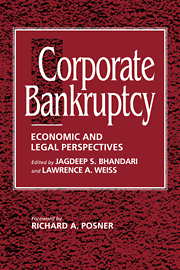Book contents
- Frontmatter
- Contents
- List of tables and figures
- Foreword by the HONORABLE RICHARD A. POSNER
- Preface
- Part I The role of credit
- 1 Leverage, Nobel Memorial Prize Lecture (1990)
- 2 Agency costs of free cash flow, corporate finance, and takeovers
- 3 A theory of loan priorities
- Part II Bankruptcy as a reflection of the creditors' implicit bargain
- Part III Beyond the basic creditors' bargain
- Part IV Workouts or bargaining in the shadow of bankruptcy
- Part V Alternatives to bankruptcy and the creditors' bargain
- Part VI Experience of other countries
- Index
2 - Agency costs of free cash flow, corporate finance, and takeovers
Published online by Cambridge University Press: 10 December 2009
- Frontmatter
- Contents
- List of tables and figures
- Foreword by the HONORABLE RICHARD A. POSNER
- Preface
- Part I The role of credit
- 1 Leverage, Nobel Memorial Prize Lecture (1990)
- 2 Agency costs of free cash flow, corporate finance, and takeovers
- 3 A theory of loan priorities
- Part II Bankruptcy as a reflection of the creditors' implicit bargain
- Part III Beyond the basic creditors' bargain
- Part IV Workouts or bargaining in the shadow of bankruptcy
- Part V Alternatives to bankruptcy and the creditors' bargain
- Part VI Experience of other countries
- Index
Summary
Corporate managers are the agents of shareholders; a relationship fraught with conflicting interests. Agency theory, the analysis of such conflicts, is now a major part of the economics literature. The payout of cash to shareholders creates major conflicts that have received little attention. Payouts to shareholders reduce the resources under managers' control, thereby reducing managers' power, and making it more likely they will incur the monitoring of the capital markets which occurs when the firm must obtain new capital. Financing projects internally avoids this monitoring and the possibility the funds will be unavailable or available only at high explicit prices.
Managers have incentives to cause their firms to grow beyond the optimal size. Growth increases managers' power by increasing the resources under their control. It is also associated with increases in managers' compensation, because changes in compensation are related positively to the growth in sales. The tendency of firms to reward middle managers through promotion rather than year-to-year bonuses also creates a strong organizational bias toward growth to supply the new positions that such promotion-based reward systems require.
Competition in the product and factor markets tends to drive prices towards minimum average cost in an activity. Managers, therefore, must motivate their organizations to increase efficiency to enhance the probability of survival. However, product and factor market disciplinary forces are often weaker in new activities and activities that involve substantial economic rents or quasi rents. In these cases, monitoring by the firm's internal control system and the market for corporate control are more important.
- Type
- Chapter
- Information
- Corporate BankruptcyEconomic and Legal Perspectives, pp. 11 - 16Publisher: Cambridge University PressPrint publication year: 1996
- 1973
- Cited by



